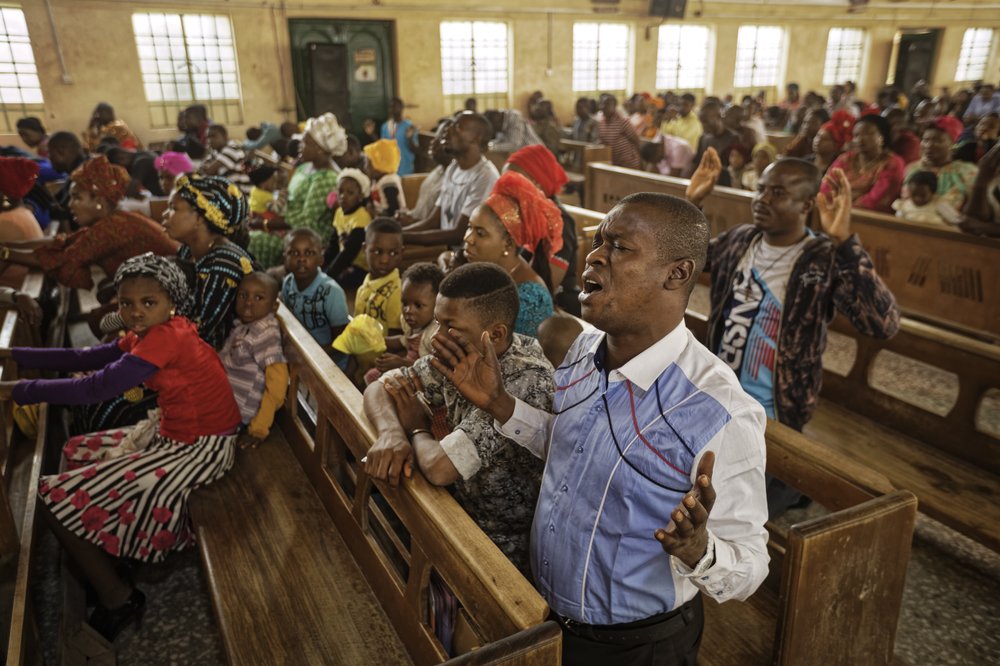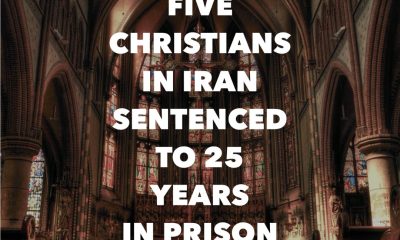us news
Religious freedom in Iran only on paper: imprisonment for accepting Christian faith

A court for the Islamic Republic of Iran sentenced a 65-year-old convert to Christianity to a three year prison term for insulting Islamic beliefs that included forwarding a message sent to his mobile phone that made fun of the mullahs who rule over Iranians.
The religious freedom organization Article 18 reported Tuesday on its website that Ismaeil Maghrebinejad, a 65-year-old convert to Christianity, has been sentenced to three years in prison for “insulting Islamic sacred beliefs.”
Maghrebinejad was sentenced under Article 513 of the Islamic Penal Code, which metes out a punishment between one and five years in prison.
Iran’s opaque justice system sentenced Maghrebinejad on January 11. He now has 20 days to appeal his prison sentence.
Article 18 said Ismaeil, who was arrested at his home in January 2019, faced two additional charges: “propaganda against the the Islamic Republic”, “membership of a group hostile to the regime”.
A judge said at a November hearing him that criminal chargeof “propaganda against the Islamic Republic” was “applicable”, because he had created a Telegram channel in which he had “promoted evangelical Christianity,” wrote Article 18.
The January hearing dealt with “insulting Islamic sacred beliefs in the cyberspace.” Article 18 said was Maghrebinejad “was found guilty because he had forwarded a message that had been sent to his phone, which poked fun at the ruling Iranian clerics.”
Mansour Borji,Research and Advocacy Director for Article 18, told the Jerusalem Post: “These excessive sentences constitute a grave violation of Iran’s constitutional and international legal obligations to guarantee freedom of religion and belief, as well as freedom of expression. We believe these loosely defined charges are used to punish individuals for adopting a religion of their choice in accordance with article 18 of the International Covenant on Civil and Political Rights, to which Iran is signatory. We call for the verdict against Mr Ismaeil Maghrebinejad to be overturned, and urge the Iranian authorities to ensure due process in this and other cases involving Christians.”
Borji also said the sentence was a “disproportionate reaction to something so ordinary.”
“The other charges that Ismaeil is facing, as well as the now-quashed charge of apostasy, related to his conversion to Christianity. This may reveal the real reason why he’s been charged for something that most ordinary Iranians do on a daily basis.”Ismaeil’s defence team had pointed out that he was not even the originator of the joke,” he added.
The US has classified the Islamic Republic as a “Country of Concern” since 1999, because its regime violates religious freedom as defined by the US International Religious Freedom Act (1998).
The section on Iran read in part: “Christians, particularly evangelicals and converts from Islam, continued to experience disproportionate levels of arrests and detention, and high levels of harassment and surveillance, according to Christian NGO reports. Numerous Christians remained imprisoned at year’s end on charges related to their religious beliefs. Prison authorities reportedly continued to withhold medical care from prisoners, including some Christians, according to human rights groups.”
Article 18 wrote that Maghrebinejad “converted to Christianity nearly 40 years ago and has since been regularly harassed by Iran’s security forces, despite Iran’s own constitution and the International Covenant on Civil and Political Rights, which Iran ratified in 1975, both guaranteeing freedom of religion, including the right to hold a religion of one’s choosing and to propagate that religion.”
Maghrebinejad ‘s daughter, Mahsa, told Article18 last year that ” she believed her father was being harassed in part because she and her husband, Nathan, who now live in America, continue to pastor Christians in Iran through the Internet.”
us news
‘God Had Big Plans’: Man’s Incredible Story of Escaping Abuse, Chaos to Find Jesus Christ

In a world of lies, David Hoffman is on a mission to deliver truth.
Hoffman, author of “Relationships Over Rules: 7 Principles to Lead Gracefully and Love Generously – Harnessing the Power of Relationships to Overcome Your Past and Embrace Your Future,” is a successful business and family man today — but his journey didn’t start out that way.
“The world tells us all these rules of what you can’t do,” he told CBN News, citing some of the lies he was tempted to believe. “I grew up Jewish, so I can’t be a believer … I was raised in a broken household without a lot of love, and so I can’t be married with kids and show them unconditional love.”
While many people might buy into lies like these based on their circumstances, Hoffman said there’s another path, one centered on the Lord.
“I just want to encourage people that, with [God] in the center — with the gifts He gives you — with the relationships He places in your life, you can reach your true potential,” he said.
Hoffman said his upbringing led to complex feelings and emotions. Overall, he felt a lack of love as a child, and this missing puzzle piece left him with a great deal of pain.
“My father left when I was 11,” he said. “I grew up with like a lot of neglect and I felt like I was alone a lot.”
Hoffman continued, “I would ask God why He would let all these bad things happen to good people.”
It’s understandable why he felt so conflicted. Hoffman described a childhood filled with abuse. The challenges were profound — so much so that, when nourishment was reportedly withheld, he resorted to eating dog food when he was hungry.
And that’s just one example of his purported struggles.
Over time, Hoffman came to understand God’s nature and character, realizing the Lord isn’t the author of any of the evil we might face in life.
Rather than living in lament, he came to appreciate this reality.
“I just want to encourage people … that your past does not define your purpose,” he said. “And your past doesn’t dictate your potential. And, so, for me, not having … many loved ones in my life, not feeling a lot of love, not having a lot of opportunity … it made me crave those and appreciate those.”
Hoffman said he has “learned forgiveness” and has “no malice towards anyone” from his past. In fact, the struggles have only made him stronger and more persistent.
“Adversity became a gift as I got older, because, again, I’m grateful,” he said, noting he doesn’t want anyone else to feel the loneliness and pain he once experienced. “I felt like I was always being told, ‘No,’ and so I want to always find the, ‘Yes.’”
For Hoffman, much of the chaos in his life was healed after becoming a Christian. Because he was raised religiously Jewish, he said he didn’t hear about Jesus until he was 30 years old.
“Unbeknownst to me, God had big plans,” he said. “I didn’t even know Him.”
Hoffman had recently moved to Charlotte, North Carolina, at the time and was working hard to find success — something he discovered after getting into real estate in 2005.
By 2008, business was booming, and then the economic crash hit him hard. Plus, Hoffman had a one-year marriage before his ex-wife left him.
“The money dried up and there was no faith foundation, and so we went separate ways,” Hoffman said.
One night, though, he felt a voice speak to him and that message changed everything.
“So, one day, I’m meeting with a dear friend … who loves the Lord, and the night before, I heard God say to me — I didn’t know it was God yet — but I heard an audible voice say, ‘You’ve trotted your way for almost 30 years. Give me a chance,’” Hoffman said. “And the next day, I went to lunch with a dear friend. And he said, ‘David, you’ve tried your way for almost 30 years. You look tired. Give it to God. Give Him a chance.’ And this same friend had taken me to church two days earlier.”
At that lunch in 2009, Hoffman realized how tired he was and how much he needed the Lord. Erupting in tears, he admitted his need for God, and his journey with the Lord commenced.
“That Tuesday afternoon I said, ‘I’m tired. I’m just tired, God. … I’ve tried it my way long enough. I’m just going to give it to you,’” Hoffman recalled. “The next day, I met my wife.”
From then on, the puzzle pieces started to come together. Now, Hoffman sees how it all connected for God to work good in his life.
“God makes no mistakes,” he said. “I just point to Jeremiah 29: 11 — ‘He has a plan for us and for us to prosper.’ And it’s not always on our time.”
Today, he’s focusing his attention on his blessings, and he hopes “Relationships Over Rules” helps people discover God’s plans for their lives.
“I want to encourage people that their past does not define His plan and purpose of their life or their potential,” Hoffman said. “And that adversity they faced last night or 30 years ago … that is actually providing a unique perspective that only they have to really be grateful to see all that God is doing [in] their life.”
Sources:faithwire
us news
നൈജീരിയന് ക്രൈസ്തവര്ക്ക് നേരെയുള്ള ആക്രമണങ്ങളില് അമേരിക്ക മൗനം വെടിയണം, ഇടപെടല് വേണം: ഇന്റര്നാഷ്ണൽ ക്രിസ്ത്യൻ കൺസേൺ

വാഷിംഗ്ടണ് ഡിസി: നൈജീരിയയിലെ ക്രൈസ്തവര്ക്ക് നേരെ നടക്കുന്ന വ്യാപകമായ ആക്രമണത്തില് അമേരിക്കന് ഭരണകൂടം മൗനം വെടിയണമെന്ന് ക്രൈസ്തവ മനുഷ്യാവകാശ സംഘടനയായ ഇൻ്റർനാഷണൽ ക്രിസ്ത്യൻ കൺസേൺ (ഐസിസി). പീഡനം, ദീർഘകാല തടങ്കൽ, തട്ടിക്കൊണ്ടുപോകൽ മറ്റ് മനുഷ്യാവകാശ ലംഘനങ്ങൾ എന്നിവ ഉള്പ്പെടെയുള്ള ആക്രമണങ്ങള് രാജ്യത്തു വ്യാപകമാണെന്ന് ഐസിസി ചൂണ്ടിക്കാട്ടി. ഐസിസി പുറത്തുവിട്ട പുതിയ റിപ്പോർട്ടിൽ കഴിഞ്ഞ വര്ഷം സംഘടനയുടെ പ്രതിനിധികള് നൈജീരിയ സന്ദർശിച്ചതിൻ്റെ നേരിട്ടുള്ള സാക്ഷ്യവും കണക്കുകളും ഉള്പ്പെടുത്തിയിട്ടുണ്ട്.
നൈജീരിയൻ ക്രൈസ്തവരുടെ നിലവിളി ചെവിയില് പതിക്കുകയാണെന്നും സഹായത്തിനായുള്ള അവരുടെ അപേക്ഷയ്ക്കു അമേരിക്ക ഉത്തരം നൽകേണ്ട സമയമാണിതെന്നും സംഘടന വ്യക്തമാക്കി. നിർഭാഗ്യവശാൽ ഏതാണ്ട് രണ്ട് പതിറ്റാണ്ടുകളായി, പശ്ചിമാഫ്രിക്കൻ രാജ്യമായ നൈജീരിയയിൽ മതസ്വാതന്ത്ര്യത്തിനുള്ള അവകാശം അതിവേഗം വഷളായിക്കൊണ്ടിരിക്കുകയാണ്. 2009-ൽ ഇസ്ലാമിക തീവ്രവാദ ഗ്രൂപ്പുകളുടെ വളര്ച്ചയ്ക്കു ശേഷം നൈജീരിയയിലെ ക്രൈസ്തവ സമൂഹം വലിയ രീതിയിലുള്ള തീവ്രവാദ അക്രമങ്ങളെയാണ് അഭിമുഖീകരിക്കുന്നതെന്നും സംഘടന ചൂണ്ടിക്കാട്ടി.
2023-ൽ കുറഞ്ഞത് 4,700 ക്രൈസ്തവരെ തട്ടിക്കൊണ്ടുപോയിട്ടുണ്ട്. ക്രൈസ്തവര്ക്ക് നേരെയുള്ള അക്രമത്തിന് പിന്നിലെ ഗ്രൂപ്പുകൾ മതത്താൽ ശക്തമായി സ്വാധീനിക്കപ്പെട്ടവരാണെന്നും ബോക്കോ ഹറാം, ഇസ്ലാമിക് സ്റ്റേറ്റ് വെസ്റ്റ് ആഫ്രിക്ക, ഫുലാനിയിലെ ഹെര്ഡ്സ്മാന് തുടങ്ങിയവരാണ് ക്രിസ്ത്യാനികളെ പ്രത്യേകമായി ലക്ഷ്യമിടുന്നതെന്നും സംഘടന പറയുന്നു. വിഷയത്തില് അമേരിക്ക തുടരുന്ന നിസംഗതയാണ് പ്രശ്നങ്ങള് വര്ദ്ധിപ്പിക്കുന്നതെന്നും കൃത്യമായ നടപടി വേണമെന്നും ഇൻ്റർനാഷണൽ ക്രിസ്ത്യൻ കൺസേൺ അമേരിക്കന് ഗവണ്മെന്റിനോട് ആവശ്യപ്പെട്ടു.
കടപ്പാട് :പ്രവാചക ശബ്ദം
us news
Concerning Stats Reveal Why Knowing Scripture Is So Important

Believers serious about following Jesus need to understand Scripture.
That’s the argument Dr. Peter Bylsma, author of “The Bible I Never Knew: A Closer Look At Christianity’s Main Themes,” made on a recent episode of CBN’s “Faith vs. Culture.”
A survey released last year by the American Bible Society found a majority of Americans wish they cracked the covers of their Bibles more often. The State of the Bible analysis showed more than half (52%) of Americans aspire to reading Scripture more regularly, CBN News reported.
More than a quarter of them, though, said they just “don’t have enough time” to do it.
Perhaps even more concerning is only 6% of professing Christians hold to a biblical worldview, with the overwhelming majority (96%) choosing syncretism, a “term used to describe a customized blend of philosophies of life that a person pieces together for their own satisfaction,” the survey explained.
Failing to study and understand the themes of the Bible, Bylsma asserted, shows a lack of seriousness about following Jesus and adhering to Christianity.
“Our culture is working against us,” he explained. “In fact, we don’t even realize we are in a culture that is influencing us in different ways. For a person to take on a different perspective based on Scripture … [you need] a network of people who are thinking like you and can support one another because the message of the Gospel and the message of the Bible are countercultural and that is hard to live in today’s society.”
Another concern is New Age philosophies creeping into Christianity.
A Pew Research Center survey from 2018 found six-in-10 Christians believe in at least one of four of the New Age themes outlined in the study: “Believe spiritual energy can be located in physical things,” “believe in psychics,” “believe in reincarnation,” and “believe in astrology.”
Additionally, a YouGov poll released in late 2022 found 87% of Americans believe in at least one belief that falls loosely under the umbrella of “new-age spiritualism.” The study found more than half of respondents (55%) said they believe karma is real, with 41% believing in hypnosis, 39% believing in UFOs and extraterrestrials, and 29% believing in the “law of attraction,” known by many as “manifesting.”
It’s often a failure to understand Scripture and the tenets of the Christian faith that result in those who claim to follow Jesus espousing beliefs antithetical to Christianity. While many come to faith without a deep knowledge of the Bible, it’s critical they, upon salvation, invest in understanding Scripture and the teachings of Jesus.
“We usually come to Christ in a simple way, usually not having counted the cost, usually not having a knowledge of what you’re getting yourself into,” Bylsma said. “You jump in and then you have that relationship and then you think that’s enough. And I would say the church doesn’t really do a good job of nurturing mature Christians.”
“Some of the churches I go to kind of have the same themes over and over,” he continued. “I would say it’s elementary; it’s almost spiritual milk. And there really needs to be a deeper dive into the concepts and the themes [of the Bible]. Twenty minutes once a week just doesn’t do it.”
It’s tempting, he continued, to feel satiated in just knowing a handful of Bible passages. But those who believe they are saved and are desiring of a relationship with Jesus “need to go further.”
To make his case, he pointed to the teachings of the Apostle Paul.
In 1 Corinthians 13:11, he wrote, “When I was a child, I talked like a child, I thought like a child, I reasoned like a child. When I became a man, I put the ways of childhood behind me” (NIV). Paul’s point was that, as believers continue in the Christian faith, they should mature spiritually.
The central — and most important — theme of the Bible, of course, is the message of Jesus. Everything throughout Scripture, in both the Old and New Testaments, points to God becoming a man, taking on the insurmountable debt sinful humanity could not pay by dying on the cross and rising from the grave three days later.
Believers who have accepted Jesus as their savior ought to invest time in truly understanding the whole of Scripture, knowing that it is fundamentally transformational. It is, as Hebrews 4:12 explains, “alive and active” and “sharper than any double-edged sword, it penetrates even to dividing soul and spirit, joints and marrow; it judges the thoughts and attitudes of the heart” (NIV).
Sources:faithwire
-

 us news11 months ago
us news11 months agoനോര്ത്ത് അമേരിക്കന് പെന്തക്കോസ്തല് റൈറ്റേഴ്സ് ഫോറം; അറ്റ്ലാന്റാ ചാപ്റ്ററിന് പുതിയ ഭാരവാഹികള്
-

 National11 months ago
National11 months agoബൈബിൾ വിതരണം ചെയ്യുന്നതും നല്ല മൂല്യങ്ങൾ പഠിപ്പിക്കുന്നതും മതപരിവർത്തനമല്ല: അലഹബാദ് ഹൈക്കോടതിയുടെ നിര്ണ്ണായക വിധി
-

 world news10 months ago
world news10 months ago50 രാജ്യങ്ങളിലേക്ക് കുവൈത്ത് പൗരന്മാർക്ക് വിസയില്ലാതെ സഞ്ചരിക്കാം
-

 National5 months ago
National5 months agoനെയ്തേലിപ്പടി ക്രൂസേഡിന് അനുഗ്രഹീത സമാപ്തി
-

 Life11 months ago
Life11 months agoസൂര്യനെ ലക്ഷ്യമിട്ട് കുതിച്ച് ആദിത്യ എൽ1; ഇന്ത്യയുടെ ആദ്യ സൗരദൗത്യം വിജയകരം
-

 National9 months ago
National9 months agoPentecostal mission center demolished in India; pastor, 17 others arrested
-

 Life10 months ago
Life10 months agoമനുഷ്യന് താമസിക്കാന് ചന്ദ്രനില് വീടുകള്; നാസ 3ഡി പ്രിന്ററുകള് ചന്ദ്രനിലേക്കയക്കും
-

 Sports6 months ago
Sports6 months agoMichigan Head Coach Jim Harbaugh Reveals ‘Mini Revival’, 70 Players Baptized Last Season
























